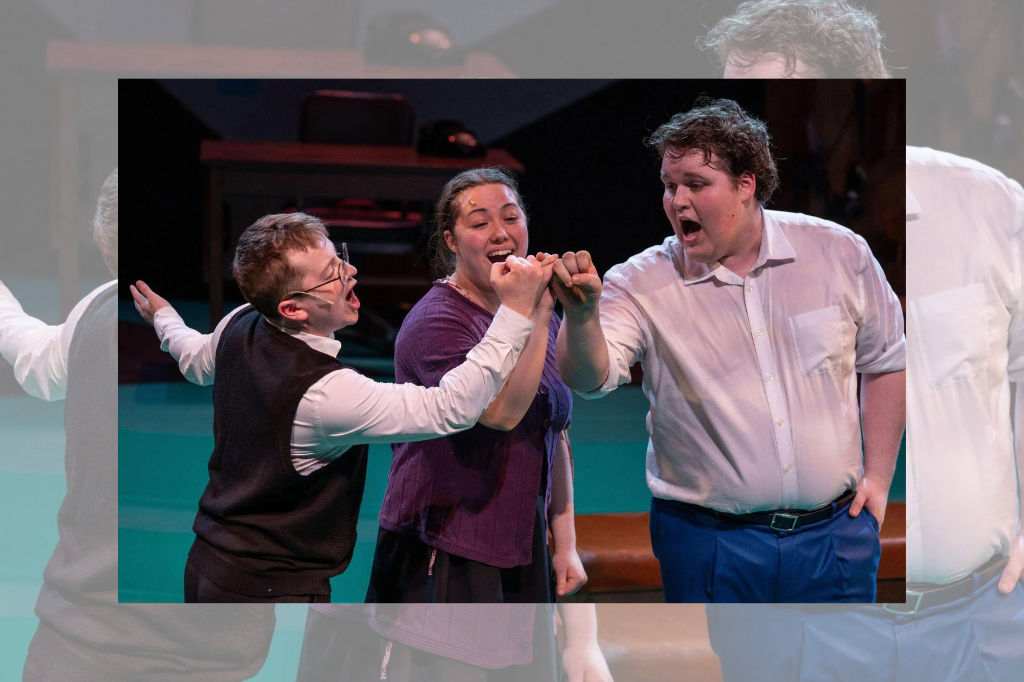REVIEW: Shifting Ground Collective’s Merrily We Roll Along reminds us to tend to our dreams
“How did we get to be here? What was the moment?”
Theatre that moves backwards in time emphasizes the inevitable. Whether the end result is triumph or (usually) tragedy, choosing to present events in an order that opposes their linear progression puts weight not on the destination, but the journey. In our travels through the past, we examine how things have changed, and how characters’ choices, both large and small, shape their relationships and fates.
Such is the case with Stephen Sondheim and George Furth’s Merrily We Roll Along, currently being staged at the Annex Theatre by Shifting Ground Collective. Sondheim and Furth adapted and altered George S. Kaufman and Moss Hart’s play of the same name to tell the story of novelist Mary, lyricist Charlie, and composer Frank on their search for artistic fulfilment, three long-term best friends who discover that sometimes the only thing more painful than never getting what you want is getting exactly what you want, but in ways you didn’t expect.
The conundrum of choosing success over friendship or integrity is a reliable conflict, and one that likely resonates with anyone who’s gone into a creative field; I consider Merrily to be one of my favourite musicals. I’m happy to report that the young company under the direction of Joshua רועי Kilimnik makes the most of their time, doing excellent work in bringing the expansive musical to life within the constraints of the Annex Theatre.
The show’s backward motion travels from 1976, when Frank mourns the dissolution of two marriages and two decades-long friendships in his California mansion, to the naive, hopeful beginnings of it all on a New York City rooftop in 1959. Interspersed with transitions that remind us to “tend your dreams” and that “time goes by,” the clever structure allows us to see a relatively straightforward, familiar story from a different, more complex angle. Sondheim and Furth seed the first act with phrases and motifs about growing up, accepting change, chasing dreams, and starting anew that come back over and over again with different meanings, giving the later-but-earlier sections an astonishing feeling of discovery in the midst of inevitability.
Fittingly for a show about time, Merrily’s musical selections run like clockwork, intricate numbers that make use of rousing counterpoint, interwoven song and dialogue, and even onstage props, like Charlie’s percussive typewriter. The pace is relentless and the show long; there’s no room for error. Luckily, Shifting Ground’s production nails the timing of just about every note and interjection, which lets the audience relax and enjoy the unspooling of this thread of fate.
The company gives itself a solid foundation with its lead trio. Jameson Mosher is perfectly cast as neurotic lyricist and playwright Charley Kringas, memorable even when not speaking thanks to his pained, dyspeptic facial expressions. As he accuses his best friend and writing partner of becoming a corporation rather than a human being in “Franklin Shepard, Inc.,” Mosher’s one-man, on-air nervous breakdown is a showpiece, performed with aplomb.
It would be nice to get a better idea from the script as to Mary’s relationship with Frank beyond her long-standing unrequited crush, but as the “dreamer” with a drinking problem, Colette Richardson (also Shifting Ground’s managing producer) lands her increasingly blowsy and poisonous asides with care.
Duncan Lang has the hard job of making the philandering sellout Frank sympathetic, but Sondheim and Furth give Frank a, well, frank pragmatism in securing his friends’ futures that your reviewer far better appreciates at almost 40 than when she saw the Shaw Festival’s production at 18. Lang, with physical stillness, leans into being the stable fulcrum that eventually breaks down — quite literally, in fact, as there’s a lot of pushing and falling over between the three when things metaphorically destabilize.
As Frank’s first love Beth, Sidney Gauvin injects necessary sparkle into the second act with her starry-eyed excitement and small-town Texas twang. In contrast, Azaria Shams is sultry and predatory as Gussie, the “other woman” whose Broadway fame and moneyed connections catapult Frank to the top and his marriage down to the rocks.
Speaking of stage dreams, a special note, too, to chorus performer Dallis Brinkman, who for our performance apparently stepped in to play a dual role for an ailing cast member with just the morning’s notice, and did so seamlessly.
The Annex Theatre comes with several challenges, but choreographer Shannon Murtagh makes the most of the tight confines, spinning up some ‘70s and ‘60s-tastic dances. In “The Blob,” Sondheim’s perfect satire of the gossipy cloud of mid-century intelligentsia who ran the artistic world of the city, Murtagh gets the entire chorus undulating together in a routine that’s part wild party and part coded threat display. And my guest, a costume designer and historian, spoke approvingly of the amount of period authenticity designer Pasha Bardell achieved, given the quickly-changing eras and evidently low budget.
On the other hand, the production struggles slightly with sound balance issues; lowering the volume of the excellent but perhaps overly exuberant orchestra might even allow the cast to go without mics. That would be a good thing, because we’re occasionally left with a hot backstage channel.
As well, there’s no need to use a conspicuous, noisy haze machine during the back-in-time transitions to set them in a more liminal space; the consistent musical themes set the scene well enough. At all other times, the production trusts in the intricacies of the work itself to see us through — and they do.
If you don’t have the, uh, time to make it to the Daniel Radcliffe and Jonathan Groff production in Manhattan, Shifting Ground’s version of Merrily We Roll Along is a worthy contender, urgently ticking along. I’d even go as far as to say the show marks Shifting Ground as a company to watch.
Merrily We Roll Along runs at the Annex Theatre until March 2. You can learn more about the production here.
Intermission reviews are independent and unrelated to Intermission’s partnered content. Learn more about Intermission’s partnership model here.














Comments